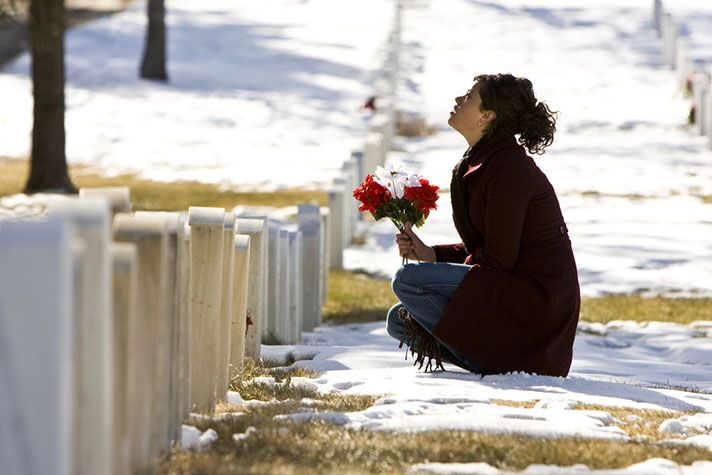
“I would have despaired unless I had believed that I would see the goodness of the Lord in the land of the living.” —Psalm 27:13
Not everyone looks forward to the holiday season.
While the days between Thanksgiving and Christmas are usually an exciting, heartfelt time, they can be extremely difficult for those who have lost a loved one.
How do you celebrate Christmas if you’re mourning an empty chair at the table? What do you say to your loved one who’s grieving?
While there are no cookie cutter answers to such an extensive, personal process, the Billy Graham Evangelistic Association (BGEA) recently talked with two people who each faced the death of a child.
Kathy Yokeley serves as BGEA’s vice president of communications and lost her 13-year-old daughter, Natalie, to cancer the week of Thanksgiving in 2008. Preston Parrish, BGEA’s chaplain, faced the sudden death of his 25-year-old son in a rock climbing accident in January 2006, the day after his father’s funeral.
The following Q&A with Kathy and Preston offer Biblical guidance:
Q: Should I celebrate the holidays right after losing a loved one?
A: (Preston) There is no right or wrong script for someone to follow in relation to observing the holiday after the death of a loved one. I think it’s certainly fine and appropriate to celebrate the holiday, if you want to. For us as Christians, Christmas is a holiday that happened historically because God wanted to deal with the issue of sin and its consequences, which is death.
If your holiday is snowmen and Santa Claus, maybe there is no reason to celebrate. Who wants to sing about “Rudolph the Red-Nosed Reindeer” in such a time?
But if you’re understanding of Christmas is that the Son of God appeared ultimately to die on the cross for us, rise from the grave, take away sin, make eternal life possible, defeat death, then you still have a reason to celebrate. How you celebrate it, what your celebration looks like, may be different—and that’s totally fine. But the reason for celebrating this holiday may be more real to you than ever before.
Q: Should I keep encouraging my grieving family member to come to our holiday gathering?
A: (Kathy) Don’t force them into doing it. If you invited me to Thanksgiving and I declined, don’t keep telling me or pressuring me, “It’ll be good for you.”
You’re not in their shoes. You don’t know the pain they’re experiencing. Don’t try to force someone into your box, but let the individual decide what’s best for them.
It does not make them look like they’re grieving their loved one any less if they choose to go smile for a day while they’re opening gifts. Whether or not they remove themselves from the environment of their own home, the pain and agony are still there. It just may give them a moment of distraction or [the opportunity to] experience some joy in that day. There’s nothing wrong with that.
Q: What got you through the loss of a child? How does that look practically on a day-to-day basis?
A: (Preston) Quite literally, the first thing that got me through it is prayer. Then knowing Biblical truth is huge. Three, the concern and caring and sensitive expressions of friends, [including] phone calls and visits.
>> Billy Graham once shared how to get through overwhelming loss.
Q: Many people have lost loved ones due to COVID, and this Christmas may be one of the first big family gatherings. What could we do to help those grieving?
A: (Kathy) There may even be somewhat of a fear [for those gathering]. You lost a loved one to an illness that’s being caused typically by mass exposure. So be sensitive to that.
If they’re with you, don’t act like [the one who died] didn’t exist. Don’t tiptoe around it. Acknowledge, “Can I give you a hug?” You can pray for them.
If they’re not with you, send them a text, [saying] this is a difficult time and you’re thinking of them. Or send them a memory. It may make them cry, but it’s not a bad cry. Because they realize their deceased loved one had meaning to other people besides just them—and the fact you’re acknowledging that means a lot.
Q: What can I do to honor a lost loved one?
A: (Preston) It can be anything as simple as filling the stocking of your loved one and giving [the gifts inside] to a needy person or launching a fairly major project to honor the person. The idea is to adapt your celebration, be creative, do what works well for you, honors the person and keeps the purpose of the holiday in view. In the Bible we read about a sacrifice of praise.
“Through him then let us continually offer up a sacrifice of praise to God, that is, the fruit of lips that acknowledge his name.” —Hebrews 13:15
One way of understanding sacrifice of praise is the praise you give when it hurts. While inclinations when hurting can be to draw in, it can be therapeutic for you, as well as others, if somewhere in the middle of your pain you can find a way to reach out. Jesus said it is more blessed to give than receive.
Q: Often, people avoid talking about someone’s loss, thinking it will be too painful. But many times, those who have lost someone close actually want to talk about that person. What’s been your experience with this?
A: (Preston) Within a few weeks, the assumption in people’s minds is you will be back to “normal.” Within two months [of my son and dad’s deaths], I had someone say to me, “It’s time to get past this.” You’ll learn to live with it, but you’ll never get past it. For each person, that’ll look different.
Sometimes people think, if I mention their departed loved one, it’s going to cause them grief all over again or bring it all back up. That goes back to idea that people are living with [their grief]. It’s not like they had it, they buried it, it’s all done.
Q: The holidays will never be the same without a lost loved one. How do you still find joy those days?
A: (Kathy) The first year we tried to decorate the tree, none of us could do it. It was too much of a painful reminder of what Natalie wanted to do. And so we thought, “We just need to get away.” So we picked up and went on a cruise. We realized then, this is nice. Because we still can celebrate the time and the season, but it doesn’t feel like it’s smothering us because we’re not at home where the memories are all on top of us.
Everyone has their own way of grieving and handling the loss of a loved one. For some people, they really want to be with family.
Q: Does the loss get easier with time?
A: (Preston) I think the best way to understand that is think of how physical pain works. When you suffer a physical injury your pain may be very acute, very intense, throbbing for some time. But with the passage of time, with healing, the intensity and acuteness of the pain may subside and take a different form. Maybe it becomes a soreness or limp you live with. That doesn’t mean you’re the same.
Q: How has your faith made a difference in your grieving process?
A: (Kathy) My faith has made all the difference in my grieving process. If I didn’t have Jesus Christ as my hope that I’ll see my daughter again one day, I don’t know that I’d want to get up every day. I also know that because Natalie belonged to God and He allowed me to be her earthly parent, I know He’s taking better care of her now than I ever could.
A: (Preston) Here is some good news: You cannot control the awful circumstances that have befallen you, but you can choose to face them and go through them as God’s child.

